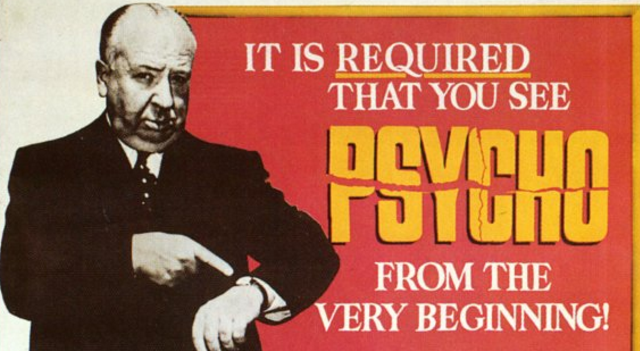Psycho, one of Alfred Hitchcock’s iconic films, didn’t come together very easily. Hitchcock’s studio, Paramount Pictures, didn’t like anything about the film and denied him a proper budget. So the director went solo and funded the film through his television company Shamley Productions. The budget was tight — less than $1,000,000. Costs were firmly controlled. Hence why, in 1960, the film was shot in black and white.

When Psycho hit theaters, Hitchcock controlled the promotion. The stars — Anthony Perkins and Janet Leigh — didn’t make the usual rounds in the media. Critics weren’t given private screenings. And Hitchcock created buzz for the film when he exerted directorial control over the viewing experience of the audience. Showings of the film began on a tightly-controlled schedule in theaters in New York, Chicago, Boston, and Philadelphia. And a firm “no late admission” policy was put in place. You either saw the film from the very beginning, or you didn’t see it all. Signs appeared in front of cinemas reading:
We won’t allow you to cheat yourself. You must see PSYCHO from the very beginning. Therefore, do not expect to be admitted into the theatre after the start of each performance of the picture. We say no one — and we mean no one — not even the manager’s brother, the President of the United States, or the Queen of England (God bless her)!
Theater managers initially balked at the idea, fearing financial losses. But Hitchcock had his way. And he was right. Long lines formed outside the theaters. Psycho enjoyed critical and commercial success, so much so the film was re-released in 1965.
Note: An earlier version of this post appeared on our site in 2012.
If you would like to sign up for Open Culture’s free email newsletter, please find it here.
If you would like to support the mission of Open Culture, consider making a donation to our site. It’s hard to rely 100% on ads, and your contributions will help us continue providing the best free cultural and educational materials to learners everywhere. You can contribute through PayPal, Patreon, Venmo (@openculture) and Crypto. Thanks!
Related Content:
Who Created the Famous Shower Scene in Psycho? Alfred Hitchcock or the Legendary Designer Saul Bass?
The 5 Essential Rules of Film Noir
Watch Alfred Hitchcock Make Cameo Appearances in 37 of His Films
Alfred Hitchcock Reveals The Secret Sauce for Creating Suspense
